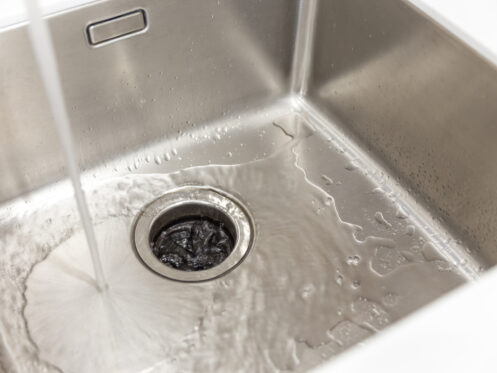Many plumbers throughout Denver, CO, and the surrounding cities agree that the term “garbage disposal” is a misnomer. Far from being a place to toss all your trash, this appliance is meant to grind up residual foods that are rinsed or washed off of dishes. To help you avoid unpleasant drain odors, jammed impeller blades, and other common disposal problems, the following is everything that you can and cannot put into this unit.
Why Your Garbage Disposal Isn’t a Catch-All
Large quantities of food can break down into a thick, pulpy paste that clogs your drain. This is certainly the case with cooked starches. The next time you’re tempted to shove large quantities of leftover macaroni, potatoes, or rice into your sink, spare yourself the need for plumbing repairs. Put them in the trash instead. When cleaning out your refrigerator, empty all large, heavy containers into the waste bin. Leave the lighter, easier job of grinding up small scraps to your garbage disposal.
In addition to heavy loads of leftovers, there are also many single-ingredient foods that this appliance simply cannot handle. Whether too crunchy, abrasive, or tough, these are items that won’t break down enough to clear your pipes and that may cause serious disposal damage.
Rendered Fats and Cooking Oils
As a rule, you should never put rendered fats or cooking oils down your drains. Even if they make it out of your plumbing system without causing major blockages, they’ll cause problems in the municipal water supply later. They’ll also leave your pipes coated in a tacky build-up that diminishes their diameters and creates the risk of future clogs.
All rendered fats and cooking oils should be cooled and placed in leak-proof, heat-safe containers. For instance, you can use an old glass jar or a coffee can if it has a tight, secure lid. Once oils and rendered fats are completely cooled, this waste can be deposited in your trash or dropped off at a local cooking oil collection receptacle.
Eggshells, Mollusk Shells, and Fish Scales
Contrary to popular belief, garbage disposal “blades” aren’t extremely sharp. They can certainly cause serious physical injuries when they’re moving fast, but they aren’t meant to slice through things like eggshells, mollusk shells, or fish scales. If you recently hosted a party and have items like these to toss, always be sure to toss them into your trash can rather than your kitchen sink. Even if they do grind up to a sufficiently small size and clear your pipes, they’ll likely cause significant damage to your garbage disposal impeller blades in the process. When you descale fish, wrap the resulting waste in newspaper and put it in the waste bin outside. Fish scales, eggshells, and clam and crab shells are also excellent additions to garden compost.
Nuts, Nut Butters, and Uncooked Starches
If you have an old jar of peanut butter or almond butter to get rid of, put it in the trash. Dumping its contents into your garbage disposal will create a thick, gluey mess that will inhibit the movement of water and other waste. Unfortunately, even grinding up certain seeds and whole nuts in large quantities can have a similar effect. Before your garbage disposal can move them along, ground seeds and nuts will develop a paste-like consistency in your drain.
Uncooked starches pose a similar problem. Noodles, rice, beans, and raw flour can swell, thicken, and wreak havoc on your disposal and your plumbing system. When cleaning out your pantry and discarding expired, uncooked items like these, put them in the trash instead.
Fruit and Potato Peelings
Many people peel potatoes in or around their sinks. This allows them to regularly rinse dirty tubers off and keep them from becoming discolored due to oxidation. However, letting even a small amount of potato peel fall into your garbage disposal can result in a clogged or slow-moving drain. All these peels will have to be manually extracted before you can use your garbage disposal again. This is also true of apples, pear, carrot, cucumber, and citrus peels.
Coffee Grounds, Loose Teas, and Tea Bags
Damp coffee grounds clump together. Even though they’re already ground up, coffee grounds can create nasty clogs in garbage disposals and the drains that support them. This is also the case with loose teas and tea bags. Tea bags with strings and tags can cause additional issues if their strings or bag materials get wrapped around impeller blades.
Chemical Drain Cleaners
If you have a broken garbage disposal and a blocked or slow-moving drain, you may be tempted to correct the problem by adding a chemical drain cleaner. When they don’t remove clogs and remain trapped, these highly corrosive solutions can eat through wastewater pipes and various components of connected appliances. They can also cause serious eye and skin burns when direct contact occurs. Even simply breathing the fumes from drain cleaners can cause respiratory distress.
When chemical drain cleaners don’t work, there’s often a lot of highly contaminated water to bail out. Repair projects become dangerous for even experienced plumbing professionals. The best way to fix a broken garbage disposal that you can’t successfully troubleshoot is by scheduling plumbing repairs.
Sharp Tools and Soft, Vulnerable Hands
A garbage disposal’s impeller blades aren’t inherently sharp. If you have your hand wedged in this unit to clear a blockage and it kicks into action, you could sustain a permanent maiming injury. Attempting to dislodge jammed impeller blades with a sharp tool can cause injuries as well. It can also turn a minor disposal blockage into a need for garbage disposal replacement.
To safely troubleshoot a garbage disposal, disconnect its power source. You can unplug your disposal or manually flip its circuit breaker.
Garbage Disposals Are for Limited Food Waste
Apart from wiping your dishes down with paper towels before putting them in the sink, there are very few reliable ways to avoid introducing food waste. There may be a stray noodle or a leftover clump of cheese on a plate, in a pot, or clinging to a pan. This is the very waste that garbage disposals are built for.
Small or Finely Chopped Foods
In modest quantities, you can use your garbage disposal to get rid of small, finely chopped foods. In modest quantities, even cooked starches can find safe passage. Just be sure to run plenty of hot water when grinding these things up. You should also let both your water and your garbage disposal run for several seconds after the sink has cleared.
Soft Foods and Liquids
Feel free to pour your unwanted beverages into your garbage disposal. Whether piping hot or ice cold, this appliance can reliably handle liquids. Even thick, viscous drinks like smoothies and milkshakes tend to be acceptable. You can also use your garbage disposal to get rid of soups, cooked oatmeal and porridge, yogurt, cottage cheese, pitted avocado, and other soft, easy-to-grind items.
Summit Heating, A/C, Plumbing & Electrical helps homeowners in Denver protect their plumbing systems and all connected appliances. We offer top-notch plumbing installation, maintenance, and repairs. We also provide expert heating, cooling, and electrical services. If your garbage disposal isn’t working or if it’s underperforming, contact Summit Heating, A/C, Plumbing & Electrical to schedule an appointment or a drain cleaning.


